by Joshua Thomas
While summer is meant for fun by enjoying the outdoors and going on summer vacations, going out in an RV can be torturing if you don't have an air conditioning system fitted in.
Just like the air conditioner that you would fit into your house, an RV air conditioner is designed to cool off the temperatures inside your rig, and it is designed to withstand various outdoor conditions such as the rain, snow, wind, and sun.
If you are looking for one to fit in your RV, these are the best RV air conditioners that you can buy in the market.
Contents
| IMAGE | PRODUCT | FEATURES |
|---|---|---|
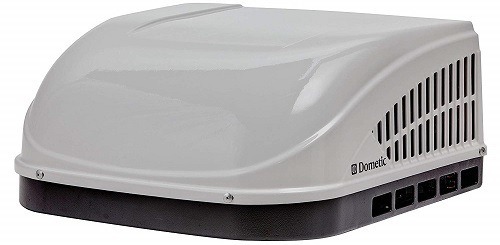 | 1. Dometic B59516.XX1C0 (Best Overall) |
|
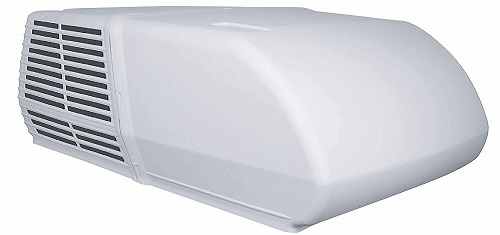 | 2. Airxcel 08-0080 |
|
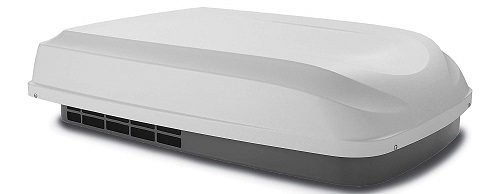 | 3. Dometic 640315C Penguin II |
|
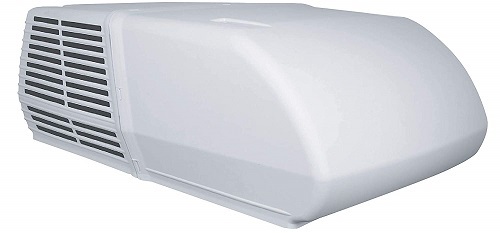 | 4. Airxcel 08-0079 |
|
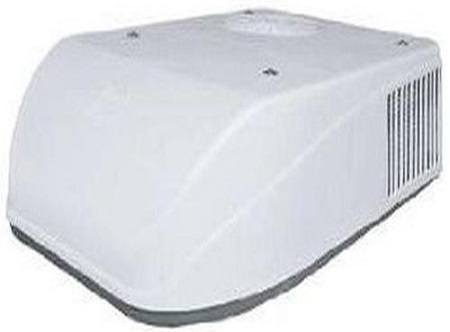 | 5. Coleman 47201A876 |
|
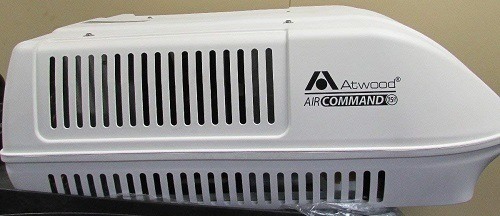 | 6. Atwood 15026 |
|
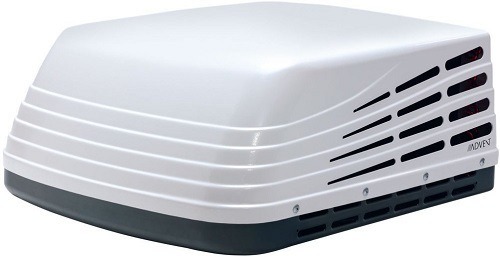 | 7. Advent ACM150 |
|
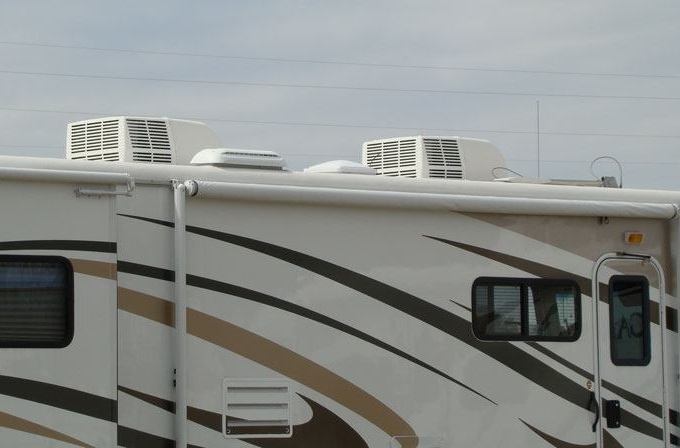

Starting off the list is Dometic's B59516.XX1C0, which is characterized by a high-performance motor and fan that delivers a 15% increase in airflow for quick cooling. This motor is actually redesigned and reengineered to be quieter, smaller, lighter and stronger for better performance.
The unit is available in two nominal capacity sizes, which include this 15,000 BTU/hour and a smaller 13,500 BTU/hour option. Both have a 115-volt AC rating at 60 Hz and are available in polar white and black colors so as to match your RV's color.
Other features include a fitting size for standard 14 x 14-inch vents, a center discharge air delivery for increased airflow, a durable design that is easy to install and maintain and it can be installed in a ducted or non-ducted setup.
However, the unit is only equipped with a single motor, which means the BTU rate may vary according to speed, and it does feature a heating element.
Pros
Cons


If you are looking for an air conditioner with a high cooling output for your RV, Airxcel's 08-0080 does stand out because it is equipped with a powerful 1/3 HP fan motor that delivers an airflow of 320 cubic feet per minute.
Additionally, the unit has a large evaporator and condenser coils that are fitted with raised lance fins for quick heat dissipation.
Other than this, the air conditioner also has a heating function and is equipped with a nominal capacity of 15,000 BTU/hour. There is the option of a heater assembly that will give 5,600 BTU/hour for chilly conditions, but this must be bought separately.
More features include an all copper tubing with gas flux brazed joints for durability purposes and a design that is optimized to work well in ducted systems.
Combined, these features make it the top-rated RV air conditioner in this review. However, it only has a single motor, which may vary the BTU cooling levels according to speed.
Pros
Cons


Dometic's 640315CXX1C0 is one of the best RV rooftop air conditioners in this review primarily because it is built aerodynamically with a low-profile design that reduces wind drag as you drive. This also gives it a sleek and contemporary appearance that looks very good.
For cooling, R410 refrigerant is used and it helps to release heat more efficiently while a quiet motor delivers the optimum balance of airflow.
The unit also has a 3-speed blower with easy-to-reach and easy-to-use controls and you have the option of using manual, electronic or wall thermostat controls.
Other features include a pre-installed module board plus a heat strip for thin ceiling application. On the downside, the unit has a relatively low nominal capacity, which is 13,500 BTUs/hour.
Also, the AC can be used in ducted or non-ducted cooling systems, though a Comfort Control Center II or LCD wall T-stat is required for ducted use while an ADB is required for non-ducted use.
Pros
Cons


If you are tight on cash, you can still get a good quality air conditioner for your RV such as this 08-0079 from Airxcel. That said, the unit is still well equipped for the job, featuring a large evaporator and condenser coils, which have raised lance fins for faster heat dissipation.
This air conditioner also has an all copper tubing with gas-flux brazed joints for durability purposes while condenser coil protection enhances longevity.
Other features include a nominal capacity of 13,500 BTU/hour, the option of adding a heater assembly (bought separately) to give 5,600 BTUs for cold weather, and an airflow of 320 CFM. However, this nominal capacity is relatively low.
Pros
Cons


Though it has a low nominal capacity of 9,200 BTUs/ hour, Coleman's 47201A876 allows you to fit in a relatively powerful electrical heating element so as to raise the heating level by 6,000 BTUs/ hour, which makes it ideal for summer and winter use.
Other than that, this product is characterized by a low-profile design that is only 8 inches tall, which means you get reduced air drag for better fuel efficiency.
The air conditioner also features two motors that enable it to deliver the same BTUs of cooling in either high or low-speed operation. That said, it has a top airflow rate of 300 cubic feet per minute.
More features include black and white color options and ultra-quiet performance on low speed for no disturbance during night time cooling. However, there is no remote control option to operate the AC.
Pros
Cons


Atwood's 15026 is quite an expensive RV air conditioner, but it has the features to show for it. For starters, it has a digital thermostat with remote control and this setup gives you very precise temperature controls.
The product is also equipped with separate condenser and blower fan motors, which combine forces to deliver 360 cubic feet per minute of cool air with a rating of 15,000 BTU/ hour. This separation ensures the AC runs quietly and with a lower amp draw for improved efficiency.
Other features include a fitting size for a 14 x 14-inch roof cutout, air-V distribution and an aerodynamic design that cuts through the air so as to reduce drag. However, the unit requires Atwood's ceiling assembly so as to make it complete.
Pros
Cons


A good RV air conditioner should fit perfectly on the roof cutout with no leaks and this piece from Advent is fitted with a watertight vent opening gasket plus 6 dense foam support pads that ensure it sits firmly and without any water leaks once installed.
The unit is made using high-grade materials that are designed to withstand harsh weather conditions while a rigid metal-built base pan holds all the internal components securely in the box.
More features include 3 fan speeds, a nominal capacity of 15,000 BTU/ hour, an optional plug-in heat strip and a fitting size for standard 14.25 x 14.25-inch vent cutouts. However, this unit does not have a remote control option and also does not have a heating element option.
Pros
Cons

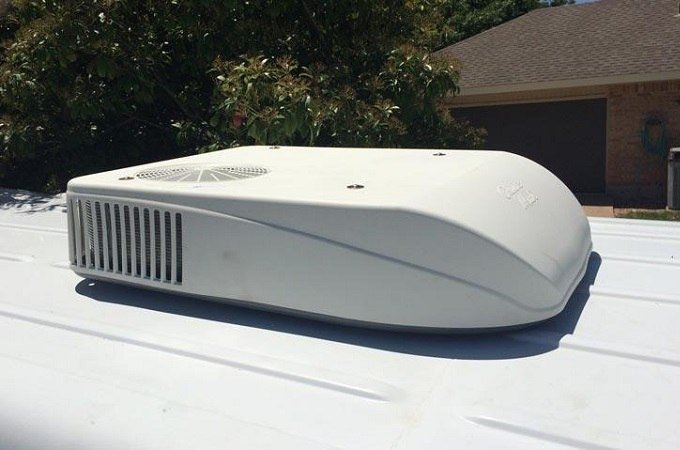
An air conditioner's cooling capacity is usually given in BTUs, which means British Thermal Units. To avoid all the complexities, what you need to know is that the higher the BTU rating, the faster that the AC will be in cooling your RV.
However, this also means that it consumes more power so as to achieve quick results. Therefore, you should consider this factor based on the size of your RV.
For instance, a 15,000 BTU/ hour AC is best for the larger class A RVs while the smaller 9000 BTU options are better for class B motorhomes.
Size should be considered due to fitting purposes. Since the space in RVs is limited, if you buy an air conditioner that is too bulky, then it might consume too much space, even if it is mounted on the roof.
The most common recommended size is a 14-inch square AC because most RVs feature a rooftop opening with these dimensions. Another desirable feature to have would be a low-profile aerodynamic design, which reduces drag from wind resistance as you drive.
These are the two main types of air conditioners. Ducted ACs function by channeling the cooled air through a duct system on your RV's floor, ceiling and walls.
This makes such a setup ideal for large motorhomes with multiple rooms in which the air can be easily channeled to each specific room so as to control each room's temperature independently.
On the other hand, non-ducted units simply blow out the cold air out of their vents and this makes them ideal for smaller RVs in which there is no need to control the temperature in each room since space is small.
A rooftop AC is usually better at saving space since its installation gets it out of your way. However, there is a downside to this. With part of it exposed to the outside, the harsh outside environment might take a toll on the external housing, resulting in wear and tear.
On the other hand, portable ACs are less susceptible to wear and tear but are usually less powerful as compared to their rooftop counterparts and occupy a lot of space inside your vehicle.
Most modern RV air conditioners are designed to be powered via AC. However, the source of power may differ and you should ensure that you have the means to supply power to it before actually buying it.
Also, you need to check the unit's power rating in watts and volts. High wattage means it consumes a lot of power and therefore, might not be ideal even though it works faster.
A noisy AC can be very annoying, especially considering the small RV space in which the sound will be magnified by echoing off the walls. Therefore, you should go for the one that is as quiet as possible especially when running at low speeds for comfortable nighttime use.
In considering the ease of use, you need to check the controls and the best RV air conditioner should have intuitive controls for managing the blower's speed and other settings such as for the integrated heater.
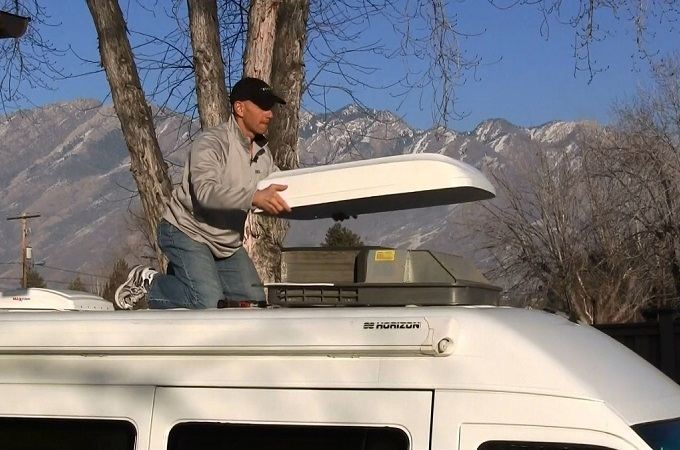
For your RV's air conditioner to remain in perfect working condition, it needs to be properly maintained. The manufacturer's handbook usually contains all the maintenance instructions but in general, you should power it off, unplug it, then do the following:
A crucial part of this process is to clean the evaporator coils and you should begin by removing the metal covers and unplugging the control board.
Next, remove the freeze sensor probe from the coil then use a purpose-designed cleaner to wash off any dirt.
You can also use normal household cleaners to carry out this process but purpose-designed cleaners are easier to use since they contain step-by-step cleaning instructions, quantities to use and the best ways to use.
The fan motor is a big part of the cooling system and it should be oiled on both ends and on its bearings. If it has sleeves instead of bearings, then oil the shaft at the point where the sleeves meet the motor's housing.
With bent fins, you should expect less airflow and reduced cooling performance. Therefore, you should ensure that they are kept straight and you can use a coil fin comb for this.
When not in use, cover the RV and air conditioner. This will prevent dust, dirt, insects and other debris from getting in and clogging the airflow system.
Shinco 10,000 BTU Portable Air Conditioners with Built-in Dehumidifier Function, Fan - Walmart Link
Shinco 8,000 BTU Portable Air Conditioner with Built-in Dehumidifier Function,Fan Mode, - Walmart Link
Dometic Brisk II Rooftop Air Conditioner, 13,500 BTU - Polar White (B57915.XX1C0) - Walmart Link
RecPro RV Air Conditioner 15K | With Heat Pump for Heating or Cooling Option | RV AC Unit - Walmart Link
Dometic Brisk Air II 15,000 BTU Rv Ac Complete ND System W/Heat - Walmart Link
RecPro RV Air Conditioner 15K Ducted | Quiet AC with Heat Pump for Heating or Cooling | - Walmart Link
Furrion FACR14SA-BL-AM RV Air Conditioner, 14.5K BTU, Black - Walmart Link
Shinco 10,000 BTU Portable Air Conditioners with Built-in Dehumidifier Function, Fan - eBay Link
Shinco 8,000 BTU Portable Air Conditioner with Built-in Dehumidifier Function,Fan Mode, - eBay Link
Dometic Brisk II Rooftop Air Conditioner, 13,500 BTU - Polar White (B57915.XX1C0) - eBay Link
RecPro RV Air Conditioner 15K | With Heat Pump for Heating or Cooling Option | RV AC Unit - eBay Link
Dometic Brisk Air II 15,000 BTU Rv Ac Complete ND System W/Heat - eBay Link
RecPro RV Air Conditioner 15K Ducted | Quiet AC with Heat Pump for Heating or Cooling | - eBay Link
Furrion FACR14SA-BL-AM RV Air Conditioner, 14.5K BTU, Black - eBay Link
All in all, getting a good quality air conditioner is key towards enjoying some quality summertime in your RV. Considering that there are different varieties of these ACs in the market, selection can be a bit challenging.
However, with the RV air conditioner review above, you will get the best RV air conditioner that works and fits best in your motorhome.
Sources
 |
 |
 |
 |

About Joshua Thomas
Joshua Thomas just simply loves cars and willing to work on them whenever there's chance... sometimes for free.
He started CarCareTotal back in 2017 from the advices of total strangers who witnessed his amazing skills in car repairs here and there.
His goal with this creation is to help car owners better learn how to maintain and repair their cars; as such, the site would cover alot of areas: troubleshooting, product recommendations, tips & tricks.
Joshua received Bachelor of Science in Mechanical Engineering at San Diego State University.